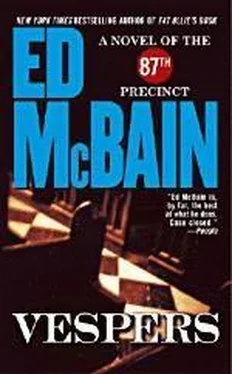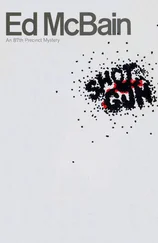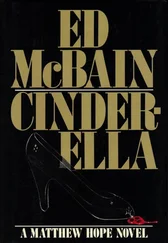"An upside-down star," Coral said.
"Inverted," Laramie said, and all three fell silent.
"What about it?" Hawes asked.
"Detective Hawes." Coral said, "we are aware...”
He wondered how she knew his name.
"... that the star painted on St. Catherine's gate might link us in the minds of the police...”
Sergeant Murchison had probably given it to her downstairs.
"... to the murder of the priest there.”
"But," Laramie said.
"But," Coral said, "we want you to know that we plan to question our congregation tonight and find out whether somebody if anybiady painted that star on the churchyard gate.”
“And if they did..." Stanley said.
"... we'll make damn sure that person comes right over here to tell you about it his own self. So you can question them and see we had nothing to do with it.
The murder. Even if someone, if anyone, is guilty of painting that gate.”
“Guilt is innocence," Laramie said.
"We'll let you know," Stanley said, and all three rose in many-splendored radiance and disappeared into the sunlight and through the gate at which they had originally materialized.
Hawes wondered how Carella was doing out there on the street.
On a bright spring morning, it was difficult to think of the street as a slum. There seemed no visible evidence of poverty here. The people walking by a leisurely pace were not dressed in tatters. There were flowerpots with blooms in them on fire escapes and windowsills. The window curtains flapping in the early morning breeze seemed clean and fresh did the laundry hanging on backyard clotheslines.
The sanitation trucks had been through early, and garbage cans were lined up empty alon wrought-iron railings that flanked recently front stoops. As Carella came up the street, a truck was sprinkling the gutters, giving the asphalt a sheen of rain-washed freshness. This not be a slum.
But it was.
The endless crush of winter had departed, and in its place there was now the false hope of spring. the people living in these tenements true, the brick did seem brighter in sunshine than it did beneath a grey and leaden sky knew that hope was the thing with feathers, as elusive and as rare as happiness. This stretch of 87th Precinct territory was almost exclusively black. And here, despite the illusion of spring, there was indeed grinding poverty, and illiteracy, and drug addiction and malnutrition and desperation. The black man in America knew where it was at. And where it was at was not here, not in these mean streets. Where it was at was uptown someplace, so far uptown that the black man had never been there, could not even visualize it there, knew only that uptown was a shining city somewhere high on a hill, a promised land where everyone went to Choate and Yale and a thousand points of light glistened in every cereal bowl.
Read my lips, Carella thought.
Nathan Hooper lived in a tenement two blocks south of The Stem.
At eight-thirty that Saturday morning, Carella found him asleep in a back bedroom he shared with his older brother and his thirteen-year-old sister.
Hooper was sixteen. The brother, dressed and out of the house already, was eighteen. The sister was wearing a white cotton slip. Hooper was wearing white Jockey undershorts and a white tank top undershirt. He was annoyed that his mother had let the police in while he was still asleep.
He told his sister to cover up, couldn't she see there was SOMEBODY here? The sister shrugged into a robe and per's mothei was having her morning coffee. She had already told Carella that she had to be at work at nine; on Saturdays and Sundays, she cleaned offices downtown. Rest of the week, she cleaned white people's houses uptown.
Hooper pulled oo a pair of jeans and went out into the narrow hallway barefooted, Carella following.
The bathroom was a six-by-eight rectan containing a sink, an ancient yellowing claw-foo bathtub with a jerry-built shower over it, and incessantly gurgling toilet bowl. A plastic was drawn half-closed over the tub. The of the curtain rod was hung with bikini t Hooper stepped in, and closed the door behind Standing in the hallway, Carella could hear him urinating and then washing at the sink. When door opened again, Hooper was drying his hands a peach-colored towel.
Wordlessly, scowling, he went back into bedroom again, Carella still following him. opened the middle drawer of the only dresser in room, took out a black T-shirt, and pulled it on his head. He sat on the edge of the bed, pulled pair of white socks, and laced up a pair of high-topped sneakers. He was wearing his hair what was called a High Top Fade, currently the ra among young black men in this city. The resembled a fez sitting on top of the head, with lower oart of the skull shaved almost clean, and Ir required very little maintenance other than an occasional bit of topiary. Hooper passed a pick comb through it, and walked out into the kitchen, still wordlessly, still scowling, Carella still patiently following. Hooper's sister was sitting at the table, a mug of coffee between her hands. She was staring through the open kitchen window at the clothes flapping on the backyard lines, watching them in fascination, as if they were brightly colored birds.
Hooper's mother was just about to leave. She was a woman in her fifties, Carella guessed. Actually, he was high by about ten years.
"Offer the man some coffee," she said, and went out.
"You want some coffee?" Hooper asked grudgingly.
"I could use some," Carella said.
"You always come see people in the middle of the night?" the sister asked.
"Sorry I got here so early," Carella said, and smiled.
The girl did not smile back. Hooper was rummaging in the cupboard over the drainboard, searching for clean cups. He made a great show of exasperation, finally banged two cups down on the counter top, miraculously unscathed, and poured them three-quarters full. A container of milk was on the table. He poured from it into his own cup, and then shoved it across to where Carella had taken the chair alongside the girl's.
"Sugar?" the girl said, and offered Carella the bowl.
"Thanks," Carella said. "What's your name?”
“Why?" she said.
"Why not?" he said, and smiled.
"Seronia," she said.
"Nice to meet you.”
"When you gonna lock up the shits beat up Nate?" she said.
"That's what I'd like to talk about," Carella said.
"Be the first one since it happened," Seronia said, and shrugged.
"That's not entirely true, is it?" Carella said. "The way I found out about it was from a report in our files. So someone had to...”
"Yeah, the blues," Hooper said. "But wasn't no detectives come around later is whut she means.”
"Well, here's a detective now," Carella said.
"You don't look like no detective I ever seen," Seronia said. "Mama says you showed her a bad but, man, you don't look like no detective to me.”
"What do detectives look like?" he asked.
"Like pieces a shit," she said.
Carella wasn't looking for an argument here. was he even certain the girl was trying to provoke one. He was here for information. A priest had been murdered. A priest who'd protected this boy on Easter Sunday.
"According to the report...”
"The report's full of shit," Hooper said. "The only thing they wanted to do was get out of that church fast, before they got lynched. They were scareder than I was. You never seen two cops writing so fast.”
"They dinn even drive him to the hospital," Seronia said. "He's bleedin' like you shoulda seen him, man. Was the priest finely took him to the 'mergency room.”
"Where was this?”
"Greer General.”
"And you say Father Michael drove you there?”
"Walked me there, man," Hooper said. "You know like Christ walkin' with the fuckin' cross on his back and everybody jeerin' him, whatever? That was me, man. I'm bleedin' from the head from where one of them fucks hit me with a ball bat...”
Читать дальше











